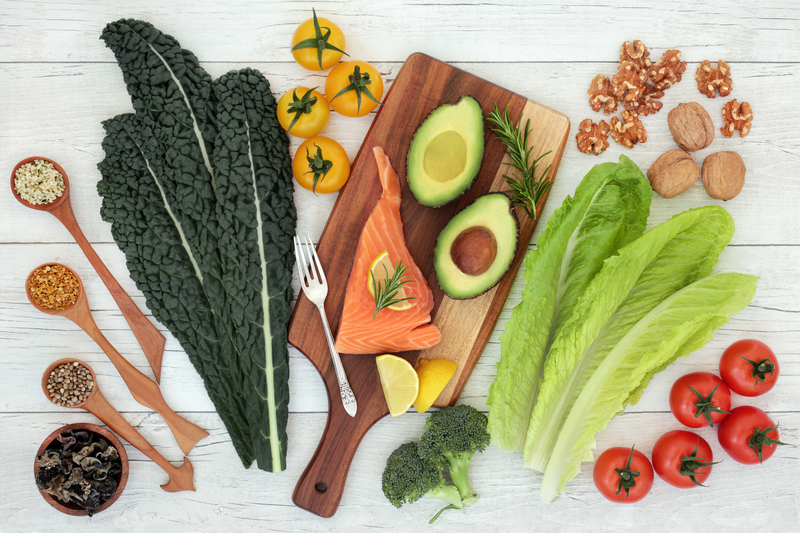See the Top 12 Nutrients and 13 Foods That Improve Mood

Depression is the leading cause of disability and a major contributor to the disease burden worldwide. Depressive disorders are associated with joblessness, poor physical health, and in its most severe forms, suicide. What’s more, depression can take a nasty toll on relationships, leaving loved ones feeling helpless, frustrated, or fearful.
Over 20 million adults in the United States (and more than 300 million worldwide) are currently battling depression. And it’s estimated 20 – 25% of women and 7 – 12% of men are going to struggle with depression at some point in their lives. 1,2 It’s arguable that these are drastic underestimates considering many people choose to sweep their emotions under the rug.
Unfortunately, public awareness for mood disorders like depression is lackluster at best. The lack of knowledge, misunderstanding, public and self-stigma provide big barriers to improving mental health. To make matters worse, mental illnesses like depression are inadequately treated. Although intensely controversial, scientific analyses show most (if not all) of the benefits of antidepressants are due to the placebo response. 3 In other words, medications (which can come with side effects, risks, and increased potential for relapse) only seem to be as effective as placebos.
Thanks to an expanding group of open-minded, integrative healthcare practitioners, a growing body of scientific research suggests diet may play a great role in both the prevention and treatment of brain-based disorders. Although the research is relatively young, the results are incredibly promising and insightful. Researchers and clinicians have begun to unravel the dietary patterns, nutrients, and foods that improve mood.
Recap: Depression affects over 20 million adults in the US and more than 300 million people worldwide. It’s the leading cause of disability and a major contributor to the disease burden worldwide.
Nutrition Psychiatry: The Link Between Foods and Mood
Nutritional Psychiatry is a relatively new field of research dedicated to the rigorous study of the role of nutrition in mental health. 4 Think about it: it’s the role that your diet plays on your mood (and the top foods that improve mood). Let’s rewind for a moment.
It was only recently—within in the last decade—that researchers began to examine and establish a link between overall diet quality and depression and anxiety. Prior to that, nutritional research (at best) focused on single foods or nutrients (e.g., omega-3 fatty acids).
In fact, the first study examining the relationship between diet quality and depression and anxiety wasn’t published until 2010. This landmark study, which was spearheaded by Australian researcher Dr. Felice Jacka, landed on the front cover of the American Journal of Psychiatry thanks to the head-turning findings showing a clear association between habitual diet quality and the high prevalence of mental disorders. 5
Specifically, the analysis of a large sample of Australian women, which was representative of the Australian population, revealed “traditional” dietary patterns characterized by high intakes of veggies, fruits, meat, fish, and whole grains was associated with lower odds for depression and anxiety disorders. On the other hand, a “western” diet of processed foods, fried foods, refined grains, and sugary foods was associated with a higher incidence of symptoms.
Even more, the researchers took into account age, socioeconomic status, education, and health behaviors. In other words, there was a clear relationship between diet quality and mental health. This paper had such a powerful impact, it was nominated the top research paper in psychology in 2010.
That study was the basis for more research on the topic, which further solidified the connection. Dr. Jacka and her colleagues even went on to establish a clear association between diet quality and depression in adolescence (again, independent of other confounding factors). 6 For example, adolescents aged 10 – 14 with the least healthy diet scores had a 79% increased risk for depression. On the other hand, adolescents with the healthiest diet scores slashed the risk of depression by up to 53%. This bears tremendous weight because half of all mental disorders start before the age of 14.
Dr. Jacka continued to pull back the curtains on the relationship between diet quality and mental health. She and a team of researchers examined the impact of maternal and early postnatal nutrition on children’s subsequent mental health as part of the Norwegian Mother and Child Cohort Study. This study involved over 23,000 women and their children. Again, they found both a mother’s diet during pregnancy and diet during early childhood were related to the child’s emotional health during the first few years of life. 7
Recap: Recent randomized controlled trials show interventions to improve diet quality improve depressive symptoms. Simply put, improving diet quality can play a significant role in the prevention and treatment of depression.
Your Diet & Your Hippocampus
Dr. Jacka and her colleagues continued to paint this picture when they examined the association between dietary patterns and hippocampus size in humans. Without getting too thick in the weeds, the hippocampus is a part of the brain associated with learning, memory, and mood regulation. It is specifically implicated in depression. Research has shown hippocampal volume is reduced (i.e., a smaller hippocampus) in adults with depression.
In the study published in the journal BMC Medicine, Dr. Jacka and team found lower intakes of nutrient-dense foods and higher intakes of unhealthy foods were independently associated with lower hippocampal volume. 8
In other words, the typical western-style diet was associated with a smaller hippocampus. This provides further compelling evidence of the connection between dietary patterns and mental health. Simply put, the picture became abundantly clear—at least from observational evidence—a healthy dietary pattern plays a protective role on the risk of depression.
Mediterranean Diet: The Best Diet for Depression?
The most noteworthy example of a healthy dietary pattern is the Mediterranean diet (rich in fresh fruits, vegetables, fish, extra-virgin olive oil, and whole grains). In fact, this diet has been associated with a 30% reduced risk for depression. 9
On the other hand, the typical Western dietary pattern, which is characterized by a high intake of processed foods (e.g., sweets, desserts, processed meats, refined grains) and low intake of fruits, vegetables, and whole grains, is associated with an increased risk of depression. 10,11
Shockingly, it’s estimated the average person consumes about 84% of calories from processed and fast foods. 12
Despite the striking evidence from observational studies, the real burden of proof lies in interventional studies. In other words, the final piece of the puzzle was to put this observation to the test in a randomized controlled trial. This is precisely what Dr. Jacka and her team did in what’s being called the SMILES trial (Supporting the Modification of Lifestyle In Lowered Emotional States). 13
In the 12-week SMILES trial, which involved 67 participants diagnosed with depression, Dr. Jacka and her colleagues found changes in diet quality resulted in significantly greater improvements in depressive symptoms among clinically depressed patients compared to a control group. (Which included patients enrolled in a social support group with no dietary intervention.) Even more impressive, 32% of the folks in the diet group achieved remission compared to only 8% in the control group.
In a subsequent randomized controlled trial (called the HELFIMED trial) published in the journal Nutritional Neuroscience, another group of Australian researchers investigated whether a Mediterranean-style diet supplemented with fish oil could improve mental health in adults suffering from depression. 14 In this study, 152 adults (aged 18 – 65) with self-reported depression were randomized to a Mediterranean diet (food supplied) supplemented with fish oil for 3 months or to attend biweekly social support groups for 3 months.
After three months, the diet group had greater reduction in depression and improved mental health quality of life scores. What’s more, they were sustained at six months. The folks in this group consumed more vegetables, fruits, nuts, legumes, and whole grains; ate a wider variety of vegetables; and ate fewer unhealthy snacks and processed meat. The researchers noted reduced depression was most closely associated with consumption of nuts, vegetable diversity, and how closely participants followed a Mediterranean-style diet.
Recap: Recent evidence shows a clear association between diet quality and mental health. Whereas a healthy dietary pattern (e.g., Mediterranean-style diet) plays a protective role against depression, the typical western-style diet is associated with increased risk.
The Key Dietary Recommendations for Preventing Depression
So, what dietary blueprint did these folks use? In other words, what kinds of foods did they eat to enjoy such improvements in their mood?
A group of Australian researchers, psychiatrists, and dietitians, including Dr. Jacka, Rachelle Opie, and Catherine Itsiopoulos, developed the ModiMed Diet based on their scrutiny of all the available observational and clinical evidence. This research clarified five key dietary recommendations for the prevention of depression: 10,15
- Follow “traditional” dietary patterns, such as the Mediterranean, Norwegian, or Japanese diet.
- Increase consumption of fruits, vegetables, legumes, whole grains, nuts, and seeds.
- Include a high intake of foods rich in omega-3 fatty acids.
- Replace unhealthy foods with wholesome, nutritious foods.
- Limit your intake of processed foods, fast foods, commercial baked goods, and sweets.
More specifically, the SMILES trial focused on increasing diet quality by supporting the consumption of the following 11 key food groups (recommended servings in brackets): 13
- Whole grains (5 – 8 per day)
- Vegetables (6 per day)
- Fruit (3 per day)
- Legumes (3 – 4 per week)
- Low-fat and unsweetened dairy (2 – 3 per day)
- Raw and unsalted nuts and seeds (1 per day)
- Fish (at least 2 per week)
- Lean red meats (3 – 4 per week)
- Chicken (2 – 3 per week)
- Eggs (up to 6 per week)
- Olive oil (3 tablespoons per day)
The SMILES trial also emphasized reducing (or altogether eliminating) the intake of “extras,” including:
- Sweets
- Refined grains
- Fried food
- Fast food
- Processed meats
- Sugary drinks
- Alcohol (Note: red or white wine, in moderation, was acceptable)
Although they’re not specifically mentioned, artificial sweeteners and dietary emulsifiers (which are commonly added to processed foods to improve texture and extend shelf life) are also suspect. According to Dr. Jacka, these components of junk and processed foods have a “noxious impact” on gut and brain health. 4 For example, a recent study in mice found dietary emulsifiers promote anxiety-related behavior and reduce social behavior, adverse changes thought to be mediated through disturbances in the gut microbiota. 16
Taken together, this provides some solid general guidelines for what to eat (and not eat) when it comes to promoting mental and emotional health. But if you’re anything like me, you want to get a little more granular and delve into some nutrients and foods that improve mood. So, let’s dig in!
Recap: Increasing consumption of key food groups (e.g., vegetables, fruits, legumes, fish, nuts, and seeds), eating a more wholesome, traditional diet, and reducing the intake of processed and junk foods are all pillars to promote mental and emotional health.
Antidepressant Nutrients: Evidence-Based Foods That Improve Mood
Encouragingly, a group of international mental health and nutrition researchers recently recommended “nutritional psychiatry” become a routine part of mental health clinical practice. Two champions of nutritional psychiatry are Dr. Laura LaChance and Dr. Drew Ramsey. In a recent study published in the World Journal of Psychiatry, these two pioneers set out to identify the most powerful foods to prevent and promote recovery from depressive disorders.
Based on their extensive research, which entailed a literature review of more than 200 scientific studies and detailed statistical analysis, Dr. LaChance and Dr. Ramsey identified “Twelve Antidepressant Nutrients.” These are nutrients that have been shown in human studies to be beneficial with regard to depressive disorders. The Antidepressant Nutrients include: 17
- Folate
- Iron
- EPA and DHA
- Magnesium
- Potassium
- Selenium
- Thiamine
- Vitamin A
- Vitamin B6
- Vitamin B12
- Vitamin C
- Zinc
After they established their list, Dr. LaChance and Dr. Ramsey analyzed a huge database of foods to calculate their anti-depressant nutrient density. This led to an Antidepressant Food Score (AFS). The top AFS-scoring animal-based foods that improve mood include:
- Bivalves, such as oysters, mussels, and clams
- Seafood, including octopus, crab, tuna, smelt, bluefish, wolfish, pollock, lobster, snail, salmon, herring, rainbow trout, and snapper
- Organ meats, like liver, spleen, kidney, and giblets
- Traditionally-raised, minimally processed meats, such as goat and emu
The highest-scoring plant-based foods that improve mood were:
- Leafy greens, such as spinach, mustard, turnip, and beet greens, kale, Swiss chard, collard greens, and dandelion greens
- Lettuces, including red, green, and romaine
- Peppers, like bell, serrano, and jalapeno
- Cruciferous veggies, such as cauliflower, red cabbage, broccoli, kohlrabi, and Brussels sprouts
- Greens and herbs, like watercress, cilantro, basil, parsley, and chicory greens
- Pumpkin and butternut squash
- Fruits, such as pumelo, acerola, papaya, lemon, and strawberry
Overall, among food categories, vegetables sat head and shoulders above the rest in their anti-depressant nutrient density. They were followed by organ meats, fruits, and seafood.
Other Top Foods That Improve Mood
Even though it doesn’t appear in the AFS scale, lean red meat also deserves a place on the list of foods that improve mood. In fact, moderate consumption of lean red meat (3 – 4 servings per week) is an intricate part of the ModiMed Diet and the SMILES trial.
This recommendation was based on the observational evidence from nutritional psychiatry showing that women consuming less (or more) than the recommended intake of red meat were two times more likely to have clinical depressive and/or anxiety disorders compared to those who consume the recommended amount (3 – 4 servings per week).18
This recommendation is in line with observational research showing vegetarians tend to exhibit higher depression scores and have more depressive symptoms than non-vegetarians. 19 Of course, red meat is a rich source of the antidepressant nutrients iron and B12 (which are often missing in vegetarian diets) as well as zinc. 15
And when it comes to nutrients that improve mood, we can’t forget about fiber. Although the evidence on the association of dietary fiber and the risk of depressive symptoms is inconsistent, a recent large study published in the journal Nutrition suggests intakes of total fiber, vegetable fiber, and fruit fiber are inversely associated with depressive symptoms. For example, folks with the highest intakes of total, vegetable, and fruit fiber had 41%, 42%, and 36%, respectively, lower risk of depressive symptoms compared to people with the lowest intakes. 20 This further emphasizes the importance of copious amounts and varieties of vegetables, fruits, legumes, nuts, and seeds.
Psychobiotics: The Role of Probiotics and Mood
Speaking of fiber, you can’t ignore the role of the gut in depression and anxiety. As we’ve previously discussed, there’s a powerful connection between the gut and brain, which is more commonly known as the gut-brain axis. Along these lines, there’s compelling evidence that an unhealthy balance of gut bacteria (dysbiosis) and intestinal permeability (leaky gut) could be a direct cause for depressive symptoms. 4,21
Emerging evidence supports the use of probiotics (such as Lactobacillus casei, Lactobacillus helveticus, and Bifidobacterium bifidum)—called “psychobiotics” by researchers—and consumption of fermented foods (such as yogurt, cheese, kombucha, kefir, kimchi, and natto) as useful dietary strategies for mental and emotional health.
The pioneers of nutritional psychiatry cautiously remind us, “It is imperative to remain mindful of any protective effects that are likely to come from the cumulative and synergistic effect of nutrients that comprise the whole diet, rather than from the effects of individual nutrients or single foods.” 15 And while it’s a very good idea to eat more of these foods that improve mood, don’t forget the most common piece of dietary advice, perpetual diet wars notwithstanding: Avoid processed foods. 22








